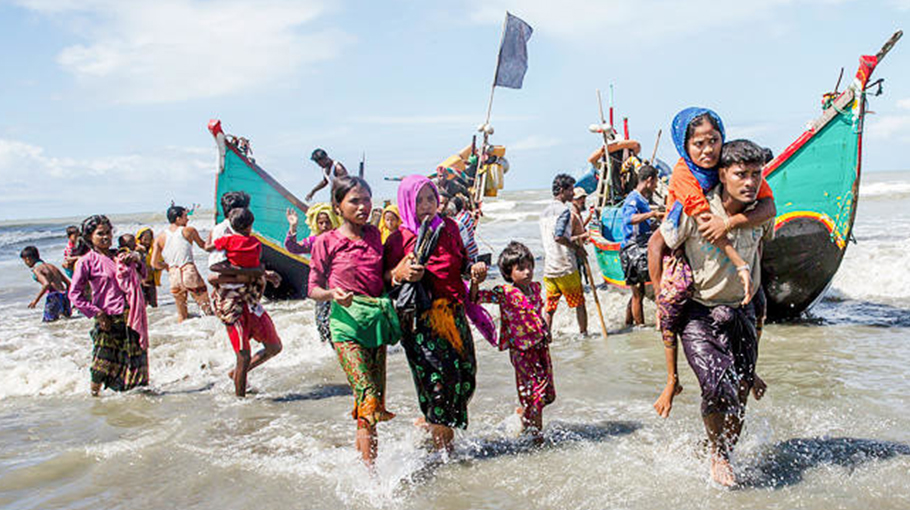Why further Rohingya influx is unsustainable?

Few events in the annals of humanitarian catastrophes have attracted people's attention and generated general concern as strongly as the Rohingya situation. The military of Myanmar has relentlessly persecuted the Rohingyas, originally from Rakhine State, resulting in a mass influx of more than 1.1 million people into Bangladesh since 2017. The terrible stories of brutality in the merciless campaign against this minority population have been reported; the world community condemns it as ethnic cleansing.
The Bangladeshi Prime Minister responded to this humanitarian crisis by making a historic choice to open the nation's borders and provide individuals escaping unimaginable atrocities refuge. Widely praised for highlighting Bangladesh's dedication to human rights and world humanitarian standards, this gesture of compassion and togetherness. With the help of foreign donors, Bangladesh has been able to bear the enormous responsibility of looking for these displaced people over the next few years.
Still, the repatriation of the Rohingya has remained a far-off target despite several diplomatic initiatives. The main cause is the Myanmar government's lack of willingness to resolve the issue, as well as some of the superpowers' lack of wholehearted support. As recently reported by Al Jazeera on May 25, the ongoing conflicts between the Arakan army and the Myanmar army have not only delayed the safe return of the Rohingya but also caused another 45,000 people to escape. With reports of beheadings, murders, and property burning aggravating the crisis, the United Nations has underlined the terrible situation.
The complicated dynamics in Rakhine State have put the Rohingya in an intolerable situation, stuck between a harsh government and rebel organizations. Long excluded and judged foreigners by the mostly Buddhist community, the Rohingya suffer systematic prejudice that prevents any real solution to their suffering. Bangladesh is struggling with an excessive refugee population from this intractable scenario, which is taxing its ability and resources.
For Bangladesh, the first wave of sympathy has turned into a long-term struggle requiring a constant reaction. Funding for the worldwide effort to assist the Rohingya, the Joint Response Plan (JRP), has dropped dramatically. This shortage has aggravated the situation and made management of the current refugee count more challenging. As resources run low, the strain on Bangladesh increases, casting doubt on her support's durability.
One important problem is the international community's reluctance to offer enough funds and real assistance for repatriation projects. Bangladesh has carried an excessive load, and there is a growing belief that it cannot keep on like this indefinitely. More fair burden-sharing necessitates political commitment and diplomatic initiatives to solve the problem's underlying causes, in addition to financial contributions.
The recent events underscore the gravity of the war and its broader regional ramifications, as even the border guard police (BGP) from Myanmar have sought refuge in Bangladesh. Although Bangladesh acted ethically by returning these officials, the story emphasizes the flux and uncertainty of the circumstances in Myanmar.
Bangladesh must make a difficult choice considering the growing violence and the clear unwillingness of Myanmar to create a haven for the Rohingya: should it keep welcoming a fresh influx of refugees? Though complicated, the response veers toward a pragmatic and essential one. Notwithstanding appeals from human rights organizations, Bangladesh finds itself unable to welcome any further influx of Rohingya migrants in the current setting. The country's resources are already limited, and the current over 1.1 million refugee population, which includes a high birth rate, presents major logistical and socioeconomic difficulties.
The recent decline in foreign financing has compounded the issue, making it more challenging to provide sufficient assistance to the refugees currently living in Bangladesh. Bangladesh remains committed to upholding humanitarian values, yet its limited capacity necessitates a firm refusal to accept additional refugees. This choice emphasizes how urgently the world community has to increase its efforts to tackle the underlying causes of the issue and provide the required help for lasting solutions.
Bangladesh's strong opposition to further influxes reflects both its constraints and a call to the world community to get active. Global powers and regional players must start more aggressively in trying to bring the turmoil in Myanmar under control. We must use diplomatic pressure, sanctions, and other measures to compel Myanmar's ruling military government to halt its crimes and create safe conditions for the Rohingya's return.
Furthermore, we must once again give top priority to funding the JRP and other projects meant to assist the Rohingya in Bangladesh. Given the global nature of the issue, we should view humanitarian aid as a shared obligation rather than a charity. Richer countries and international organizations must provide continuous, significant assistance to ensure that the Rohingya have access to necessities and services.
The Rohingya's suffering sharply reminds us of the frailty of human rights and the terrible consequences of religious and ethnic bigotry. Although Bangladesh's acts have shown compassion, it is abundantly evident that compassion by itself is inadequate. To help those who have suffered most from this humanitarian catastrophe and to solve the situation at its source, the whole community has to act forcefully and together.
Bangladesh, despite rising to the challenge and demonstrating an amazing degree of humanity, finds itself at a critical juncture. The country has accomplished more than many others under similar circumstances would have. The international community bears the responsibility today to react with the urgency and dedication required by the circumstances. We can only expect to see the suffering of the Rohingya stopped and stability restored in the area through a coordinated and continuous global effort.
The writer is a Professor in the Department of Public Administration at the University of Rajshahi.




